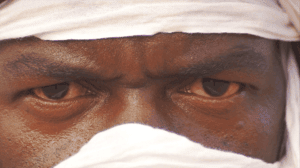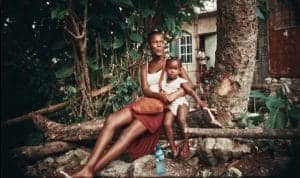by The People’s Minister of Info JR
The Matatu Film and Concert series is one of many dynamic film festivals that call the Bay their home, but its most unique quality is that it highlights filmmakers from Africa and the diaspora outside of the U.S., as well as covers subjects that are important to how we see ourselves, and how we see the world.
Michael Orange, the Matatu curator, has exquisite taste in cinema that never fails to captivate movie-goers with history and original, rich stories that sometimes expose differences in thinking and at other times show a shared human reality that is easy to understand across cultural, geographic and generational lines. In addition to being the Matatu curator, Michael Orange is extremely articulate, and here is our back-n-forth about what Matatu has in store for May.

M.O.I. JR: This year you are doing more of a concert series with a few films, how and why are you transitioning out of doing a full-blown film festival like in the past?
Michael Orange: So many breathtaking films cross my desk each year that I’ve never shared merely because they’ve not fit within a narrow curatorial window. That’s changed. I don’t want to be a gatekeeper anymore. I’m more interested in cartography. The films are conversational coordinates which navigate the historical moments impacting people’s lives today.
M.O.I. JR: What is Matatu truck, and how does it relate to what you are doing with international cinema and music?
Michael Orange: The Kenyan matatu, the Thai tuk-tuk and the Brooklyn dollar van are radically accessible means of public transport used by people around the world. They’re as much a means of travel as they are vessels to another world.
Every ride is a shoulder to shoulder experience that includes political commentary, the latest trends in music and breathtaking scenery. Our film screenings replicate these experiences as immersive as vehicles where people come face to face with issues that matter to people all over the world.
M.O.I. JR: Can you tell us when everything is happening and what films and musicians are in the lineup?
Michael Orange: On Saturday, May 19, we’re featuring “ANDAZ,” the longest running Desi-Bollywood dance party in America. The party is based in Portland and was inspired by the Truth Hurts song “Addictive,” featuring hip hop legend Rakim and a prominent sample of the Bollywood song “Thoda Resham Lagta Hai.”
The party highlights the arc of Desi influence on American pop culture through the years. I feel it is especially relevant to the ongoing Matatu conversation, as the Indian Diaspora is facing many of the same identity challenges in Portland as the African Diaspora faces in the Bay Area.
On Tuesday, we run a film from Haiti called “Jean Gentil,” which follows a well-educated man from the fast-paced city of Santo Domingo to the developing Haitian countryside. It is a melancholy tale, and I think a lot of people will resonate with his despair.
Oakland composer Zachary James Watkins, who just premiered an original composition at Carnegie Hall, performs immediately following the film, along with Oakland’s griot TuReedah Mikell. We speak so much about high vibrations. This program is for those who have intimate relationships with the low vibration.

We’re offering three screenings of “Black Mother” between May 23-25. Harlem filmmaker Khalik Allah returns with this look at the women of Jamaica, presented in three trimesters, documenting the woman’s role as Mother of Earth.
Khalik regards himself as a Nat Turner filmmaker, as apparent by his last feature, “Field Niggas,” which was filmed on the corner of 126th Street and Lexington Avenue. We’re bringing Khalik out to speak after each of the screenings. It’s a tremendous opportunity, as the film is running concurrently at The Lincoln Center and the Museum of Modern Art.
Finally, on Thursday, May 24, we’re bringing back one of our favorite performers from last year, Mdou Moctar from Niger. Mdou starred in and co-wrote a rework of the film “Purple Rain,” and then his band played immediately following the film.
They’re coming back with another film that was co-written by Tuaregs in the city of Agadez, Niger. Agadez is noteworthy as a marketplace where migrants from all over the continent travel to barter with people who specialize in getting migrants safely through Libya, across the Mediterranean, and into the European Union.
Both the film and musical performance offer front row access into the other side of U.S. foreign policy, spoken directly by the people living in the region.
M.O.I. JR: You always have exceptional international films. What do you look for in a film before screening it? And where do you procure your films from?
Michael Orange: Thank you, JR. People often visit movie theaters in the South because they’ve got the best air conditioning in town. I believe cinema should offer some of the best thinking in town. I look for care for the human condition, which includes the viewer. Sit with anything directed by Alain Gomis for an example of that.
There are so many underrecognized filmmakers working in the canon of African cinema. A lot of the work involves sustaining relationships with filmmakers, reps and institutions.
M.O.I. JR: What excites you most about international Black cinema? How does it speak to you, when it was made by a foreign African culture?
Michael Orange: I’ve been listening to Black composers and asked myself why I wasn’t referring to them as African composers. After watching “Black Panther,” that’s the question that I keep circling.
I suppose the filmmaking I’m drawn towards aligns itself with the scored experience and its ability to pay reverence to all that we feel as human beings. We own very little land in America, and I feel that may skew our relationship with time.
There is a patience that I’m drawn towards in the telling of a story when it’s made in a place where land and time are more equitable resources.
M.O.I. JR: What interests you most about African music that is not created in the U.S.?
Michael Orange: I’m attracted to associations and references that aren’t yet familiar to me. What attracts me to African music and film made upon other soil is likely the same as what attracts people in other places to African music made upon U.S. soil. It’s other. It’s another.
M.O.I. JR: What do you want people to get out of this year’s Matatu film showings and concert series?
Michael Orange: A greater awareness of the abundance of African film and filmmakers in our world today, willfully navigating beyond the bounds of a Hollywood framework.
M.O.I. JR: How could people stay in touch with you as well as find out more online?
Michael Orange: People may join our list serve at the bottom of our page at www.matatu.co. We’re also on Facebook at www.facebook.com/matatufestival. If people would like to contribute resources to our work with African cinema, they may email me directly at morange@matatu.co. Thank you, JR. This has been wonderful.
The People’s Minister of Information JR Valrey, journalist, author and filmmaker, can be reached at blockreportradio@gmail.com or on Facebook. And tune in to BlockReportRadio.com.





